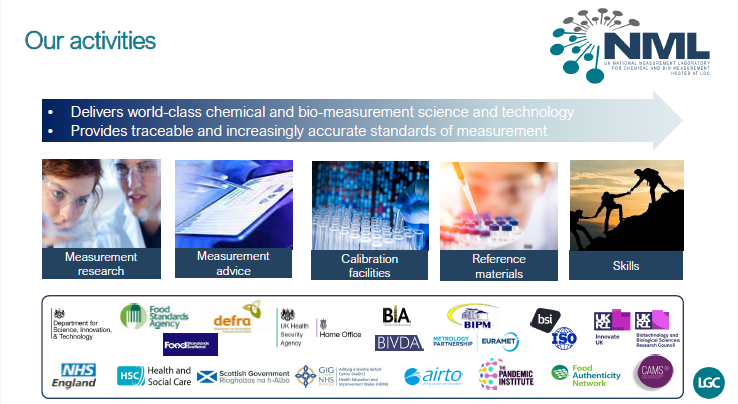FST JOURNAL
National Laboratories
DOI: https://www.doi.org/10.53289/TBNW2234
The UK National Measurement System (NMS)
Dr Julian Braybrook

Dr Julian Braybrook became the UK Government Chemist in June 2018. He is currently Director of the National Measurement Laboratory at LGC, a leading life science tools company providing components and solutions across human healthcare and applied market segments, where he is responsible for the science strategy and partnership development for regulatory analysis and metrology (measurement science) programmes that support the UK National Measurement System.
Summary:
- The UK NMS develops and maintains internationally recognised measurement capability, standards and practices
- The NML uses advanced chemical and molecular and cell biology measurement capabilities to support innovation and economic growth in the UK life sciences, green industries, and food sectors
- We need an environment that encourages continued long term commitment from the National Laboratories
- Such long term commitment would allow the National Laboratories to foster innovation, secure human resources and ensure provision of the infrastructure needed to deliver our capabilities
- We need a champion that values National Laboratories across the system; broadly across government and into the public
- We need to remove the barriers to cross government engagement to allow greater accessibility and permeability across and between the National Laboratories to make best use of these capabilities for the benefit of the UK.
There are over 620 billion pounds worth of goods and services traded annually in the UK, which rely on some measured quantity or specification, and that's probably an underestimate. Without the confidence behind purchased goods or services meeting their specification or conforming to regulatory or statutory requirements, UK businesses are undermined. This is where the UK national measurement system (NMS) really comes into play. It is an essential part of the UK research infrastructure and effectively develops and maintains internationally recognised measurement capability standards and practices. There are a number of laboratories that are part of the NMS, but I will focus on the National Measurement Laboratory at LGC.
Our role is about the science of measurement. We're designated for areas involving chemical and biological measurement, with some exclusions where other laboratories cover part of the space. We are internationally leading in our measurement science, as indicated by recent international science review. We have, what we would term, sovereign measurement traceability in chemical quantitation and newer areas, like nucleic acid quantitation and nanoparticle number concentration. We are recognised as a Public Sector Research Establishment (PSRE) and a strategic national asset.
As a UK Government Chemist, I have a statutory referee analysis and advisory function to government, particularly around food and feed. We are a national reference laboratory for certain areas of food and feed additives, and in genetically modified organisms (GMO) in food and feed. We also offer GMO authorization services, post EU Exit. In addition, we manage MHRA laboratories for the chemical testing of medicines on the UK market.
Now, being a relatively small national laboratory, we achieve agility through use of our core platform analytical technologies into different measurement challenges areas (healthcare, sustainability etc). We supplement these by strategic technology- and sector-based partnerships with universities, providing place-based measurement solutions.
We maintain and grow measurement capabilities so that the UK is recognised around the world as a major contributor to a global harmonised measurement system. This provides confidence in UK businesses, but also confidence for inward investment from other countries. I am going to provide just one example of the development and application of our these measurement capabilities.
Supporting the UK diagnostics Industry
We use our advanced nucleic acid measurement capabilities to support the UK diagnostics industry, beyond infectious diseases and pandemic preparedness; you can also think about antimicrobial resistance and precision medicine - some of the things of the future that we're going to have to start to think about for patient benefit. We lead the development and delivery of the international roadmap to metrology readiness for infectious disease pandemic response. We did respond nationally and internationally in the last pandemic within a several month timescale, but we need to respond as a measurement community even faster next time. We need to do this in a way that can be called upon by ministers and the like, in a matter of a few days. For this reason, we established an international pandemic task group and we are running measurement comparison studies (so-called fire drill exercises) that are demonstrating molecular diagnostic standardisation globally at this timescale. We've also developed test criteria that allows decisions to be made for novel diagnostics, particularly around COVID-19 variants of concern and variants of interest. We value assign nucleic acid control materials for the Health Security Agency (HSA) and NHS laboratories that are really important in the clinical adoption of these infectious disease tests. It hasn't just been COVID-19. Since the pandemic, we've addressed monkey pox, avian flu, and swine flu issues that are still around today. We're providing the core reference methods and materials that allow people to measure accurately and we're taking a complementary technology approach with UK HSA to develop nucleic acid synthesis capability. This will help remove some of the current reliance on international providers during pandemics, and help improve biosecurity at the same time.

We’ve provided access for NHS healthcare scientists to the breadth of UK PSRE measurement capabilities to help them create, expand and test new approaches that will improve the quality of patient care. Some of our outcomes to date include improving the national newborn screening testing programme, establishing best practices for minimal residual disease testing and working with the national genomic laboratory hubs to standardise their approaches and thinking about the rapid adoption of novel genomic sequencing technologies into the NHS. Other PSREs have provided implementation and new audits that assess and improve the accuracy of patient treatment for delivery of solutions for detecting cancers of various sorts.
Looking forward
We’re working with colleagues, not only to think about what the national vision for engineering biology might be to revolutionise medicine, food and environment, but more specifically about how that can be done. So we are working with the UKRI-BBSRC funded engineering biology mission hubs and awards and our first task was to embed metrology and standards practice into their thinking. With others in the NMS and government more broadly, we have also been helping shape what the regulation might need to look like for these products in the future. We have already delivered pilot training modules for both students and early career scientists across the engineering biology centres and we're now rolling these out to the wider community. This provides the concept for upskilling the next generation of workers in the field, and helps reduce the threat of skill shortages down the line.
We have initiated the first of several draft standards within the International Standards Organisation (ISO), debating gene expression analysis of engineered cell systems. This is us leading the way for the UK in new and emerging standards and regulation for the field. We’re now starting to work collaboratively with the UK engineering biology community to adopt best measurement practice; so helping establish measurement methods and materials that will be used to develop robust data that best addresses the complex challenges that the community is facing at the moment. Whether that's in microbial food, and the regulatory hurdles, plastic pollution, recovery of metals through environmental processing, or even genetic control systems for advanced medical therapies; that's where we're operating at the moment.
Suggestions for an incoming government
Firstly, I think we need an environment that further encourages continued and long term commitment and investment in the National Laboratories.
Secondly, we need to look at how that long term commitment will allow us to foster innovation, secure the necessary human resources and ensure provision of a suitable infrastructure needed to deliver nationally and internationally acknowledged capabilities that will allow us to stay at the forefront of scientific research and innovation and meet broader research infrastructure system needs.
Thirdly, we do need recognition in the form of a champion that values National Laboratories across the system and broadly across government and into the public.
Finally, we need to remove the barriers to cross government engagement that will allow greater accessibility and permeability, ensuring better coordination and flow between the National Laboratories to make best use of these capabilities for the benefit of the UK.
